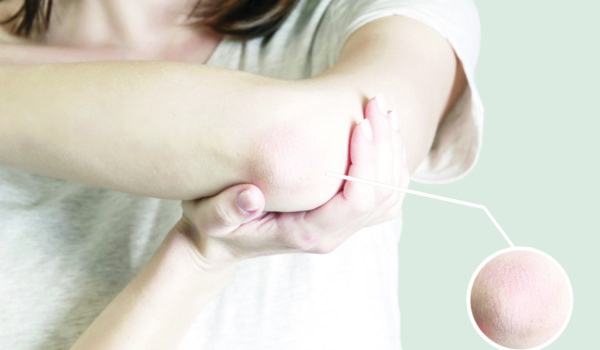
The winter season doesn’t have to spell doom for your skin
By Christa Shephard
Ah, winter. A truly beautiful season of twinkling Christmas lights and hot chocolate; time with family and friends; cable-knit sweaters and tiny, graceful snowflakes floating down past your nose. Or … is that dry skin?
With the dream-like beauty of winter comes dry, cold air, which irritates the skin and causes redness, inflammation and even flaky or scaly patches on the face and other areas of the body. Many people deal with dry, irritated skin during winter, but thankfully, you don’t have to. There are plenty of home remedies — some hiding in plain sight — to help.
Hydration
One of the most effective lines of defense against unhealthy skin is staying hydrated. The importance of drinking water cannot be overstated.
Michele Hendrickson, certified laser technician at Dolly Vita Aesthetics, says one of the first questions she’ll ask clients is about their water intake. “A lot of times, people just don’t even drink enough water. I would usually tell them to shoot for a gallon a day,” she says.
Although she knows that the gallon goal is a lofty one, it helps clients to have a visual when they think about their hydration.
Additionally, certain drinks you may enjoy — like coffee or wine — may also irritate your skin. “Try to avoid too many caffeinated beverages that might dehydrate the skin; alcohol can [also] be dehydrating,” Hendrickson says.
Diet
The way you fuel your body plays a big role in how your skin — the largest organ on your body — fares during any season, but especially winter. When skin is dry, inflamed or irritated, it can be a direct result of a poor diet.
Samantha Vandivier, manager of Transformations Salon and Spa, says, “If you can add in more healthy fats into your diet, like omega-3 and 6, that’s going to help your skin strengthen its moisture barrier, too.”
Additionally, try limiting your intake of sugary foods. Perhaps you’ve noticed your face seems extra puffy after a few too many sweets. Cutting back on the confections can help you avoid excess sugar, leaving you dehydrated, which causes both sagging and inflammation.
Replace that excess sugar with a supplement that can help promote skin elasticity and hydration, as well as the overall health of your hair and nails.
“I usually recommend that they take a multivitamin and a collagen supplement that has type 1 and 3 collagen in it,” Hendrickson says.
Products
Of course, no skin care routine is complete without the topical products that keep our dermis healthy. While no two skin types are alike, there are a few go-to products professionals highly recommend.
“Using things that have hyaluronic acid in them are good to attract moisture and plump and hydrate the skin,” Hendrickson says.
Hyaluronic acid is a naturally occurring sugar in the body. It moisturizes the skin, eyes and joints. When your skin is dry, replenishing its stock of hyaluronic acid can reduce the visibility of fine lines.
Retinol, a form of vitamin A, will also help reduce the visibility of aging as well as acne. It can soften rough patches on the skin, which often show up during the wintertime.
“[Retinol] can be kind of drying, but also it’s going to help increase that cell turnover, exfoliate the dead skin cells, and it’s also going to stimulate collagen production,” says Hendrickson.
Last but certainly not least — you may have guessed it — find a good, heavy moisturizer to soothe and quench your skin.
“If you are somebody that’s dealing with dry skin, you might need to use a moisturizer that has a little bit of oil in it,” Vandivier says.
Speaking of moisturizers, Blythe Potter of Bargersville Wellness has a very important, often overlooked product to add.
“I even still, which surprises me, have people asking if they need an eye cream,” Potter says. The answer, according to her, is literally always yes. “Because the eyes don’t produce oil around them; they don’t have oil glands,” she says. “It’s very thin skin, and it gets affected by things differently.”
Remember, at-home regimens are not set in stone. You may need to change them seasonally; what works for you in the winter may have you feeling greasy in the summer. It’s important to take stock of what works best and when it works best, and keep a healthy rotation throughout the year.
The Little Things
It’s not all in the physical products we consume. There are some unexpected tricks that can help your dry skin without completely overhauling your current skin care routine.
Consider using a humidifier in the winter, which can ease the effects of dry skin, such as itching or cracking.
Vandivier explains: “When you turn on your heat at home, it really dries out your house and dries out the air, which then is going to suck all your moisture out of your skin. Using a humidifier to help replenish that moisture in the air is huge.” Even your shower, which can feel wonderful on a blustery day, can add to the problem.
“Hot water is really drying,” Vandivier says. “I know it feels really nice to get in a hot shower, especially when we’re cold. But honestly, if you can just take more of a lukewarm shower, that’s going to be way better for your skin.”
Professional help
If you find that these treatments are just not cutting it, or you have other questions, aestheticians are here to help. However, for serious concerns or more mysterious issues, see a dermatologist.
“There’s a fine line to when I would say you need to see an aesthetician versus a dermatologist, but for most everyday skin concerns, aestheticians are a great place to start,” Potter says. It can be hard to know when to consult a professional. Does one need to wear visible, physically uncomfortable symptoms of winter dryness on their face to seek help? Absolutely not!
“Ideally … you should consult a professional before you’re even having skin issues. The best way to deal with skin problems is to deal with them before they even exist,” Vandivier says.
And that’s because a professional is trained to know the nuances of different skin. “My skin and your skin are going to be completely different,” Potter says. “Even if we’re the same age, race, gender, same occupation, same geographic location, we’re going to have very different skin concerns and needs.”
Winter is also a great time to treat damage that comes from spending the summer enjoying the sunshine. For example, you could use the time to laser away discoloration at Dolly Vita, rejuvenating the skin to leave you with a youthful glow.
“Sun-damaged skin often can be treated with different types of laser treatment,” Hendrickson says. “It’s a great time to address sun spots, age spots, melasma, which … can even be brought out worse by light and heat, like in the summertime.”
But if you’re not seeking such intense corrections to your skin, you can treat yourself to a tranquil spa day.
Bargersville Wellness offers many treatments for dry skin. “We do full body, dry body brushing,” Potter says. “We do facials, which includes dermaplaning … just a variety of different machines for a variety of different skin conditions.”
And if you find yourself overwhelmed by all the skin care options on the shelves of your favorite stores, Transformations Salon and Spa offers guidance.
“Our consultations are completely complimentary,” Vandivier says, “so even if you don’t want a skin care treatment — even though I think everybody should have them — we can still book you a time to just sit down and talk with one of our aestheticians, and they can kind of guide you and make recommendations for your skin.”
The key to healthy winter skin is in the details. Exfoliation and lotion alone are not always enough. While you’re enjoying the fluffy snow and twinkling lights of winter, put your body first and keep yourself glowing and comfortable this winter.


